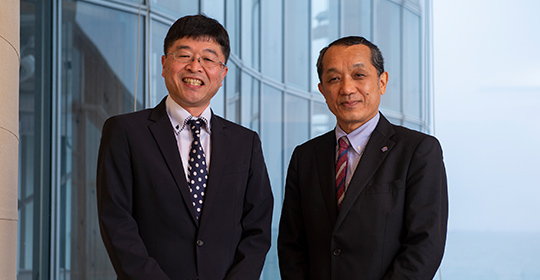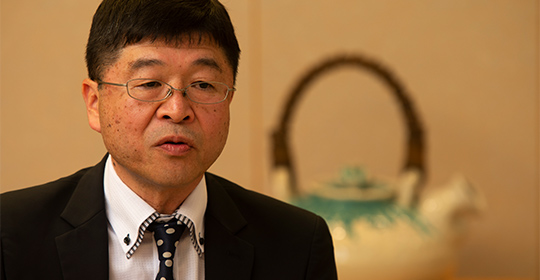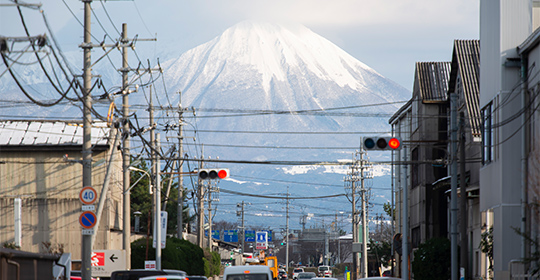

Q: Why did Tottori Prefecture introduce an IP business matching project?
Strengthening the Management Base of SMEs by Developing New Products that Utilize Patents
In Tottori Prefecture, there are major electrical and electronics manufacturers in the eastern, central, and western regions, and subcontractors related to each gathered to form a large corporate entity. Additionally, there are many food processing manufacturers due to the thriving agriculture and fisheries industries. However, many SMEs were in trouble as the businesses of the major manufacturers continued to shrink and pullout.

From left, Mr. Yamamoto and Mr. Ashizaki
It was necessary to strengthen their management bases to transform them into independent companies that don't depend on major companies, and one of the ways to do this is by developing products under the company’s own brand. However, in small companies, the resources available for development are limited. As such, we focused on matching SMEs with technologies and large companies with licenses for a variety of advanced technologies, and the Tottori Prefecture Intellectual Property Center held an intellectual property business matching meeting to support new products and commercialization that utilize the intellectual property of companies within the prefecture. Through these new encounters, we would like to accelerate the development of new products and contribute to the construction of new business styles.

Q: Has the intellectual property business matching project spread to businesses within the prefecture?
Starting with Kawasaki City as a Best Practice, the Number of Participating Companies is Increasing Year by Year
What we referred to were Kawasaki City's initiatives. As one of Japan's leading industrial areas, Kawasaki City has a concentration of SMEs with excellent technologies, and also started the intellectual property matching project from an early stage. We didn't have the know-how when we first started our intellectual property matching project, so we learned quite a bit from Kawasaki City. We also participated in the intellectual property business matching symposiums and exchange meetings hosted by Kawasaki City, and we were able to connect with major companies interested in intellectual property business matching projects. It was also at an event in Kawasaki City that we met the person in charge of Nissan's licensing business. When the project first started, it was difficult for companies within the prefecture to understand the merits of investing in the licensing project, but the attractiveness of the technologies held by major companies has gradually spread, and the number of participating companies is increasing year by year.
Q: How do you feel about Nissan's licensing business?
The Technology was Born at a Production Site, so It is Possible to Build a Sales Strategy
While many local governments are promoting intellectual property business matching projects centered around financial institutions that are focused on supporting SMEs, we are characterized by having a great deal of staff who were employed by electrical manufacturers. Our strength is that we have knowledge of the technologies the SMEs have and can provide professional advice. It is possible for us to introduce appropriate matching projects because we visit SMEs within the prefecture and understand their technologies with our own eyes.

Nissan has been participating since the beginning of the intellectual property business matching project. Problems at production sites are often common, no matter the industry, and Nissan's marketing, about their technologies for solving on-site problems to improve production quality and efficiency was clear. I felt that SMEs within the prefecture would be able to draw a sales strategy, even if they commercialized it. Japan Micro System Co., Ltd. is not a company that manufactures mass-produced products, but it has a wide variety of outstanding technologies such as sensor technologies for inspection equipment, software development technologies, and mechatronics technologies, so I thought they would be suitable for commercializing Nissan's licenses. They became interested when I reached out to them, concluded a number of licensing agreements, and are now working hard towards commercialization. Nissan's support system for Japan Micro System Co., Ltd. has been perfect, and I think they have built a good relationship. We would also like to further increase the number of successful cases of intellectual property business matching and contribute to the region's revitalization.

Established by Tottori Prefecture as an intellectual property support organization, the Tottori Prefecture Intellectual Property Center is jointly operated by the Tottori Industrial Promotion Organization's Intellectual Property Center and by the Tottori Prefecture Invention Association. As an intellectual property utilization business support project, the Tottori Prefecture Intellectual Property Center provides consistent support from the idea stage through to commercialization of new products and new commercializations that utilize the intellectual property of companies in the prefecture, holds intellectual property business matching meetings, and also conducts patents distribution support projects.
Tottori Industrial Promotion Organization https://www.toriton.or.jp/
Tottori Prefecture Intellectual Property Center https://tottorichizai.com/

The license of "AGV Condition Monitoring Technology" developed by industry-academia collaboration, has been offered to the company in Tottori Prefecture.













